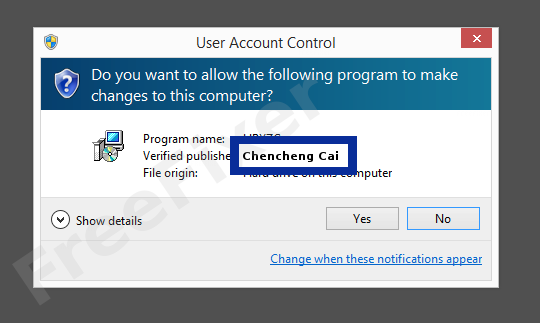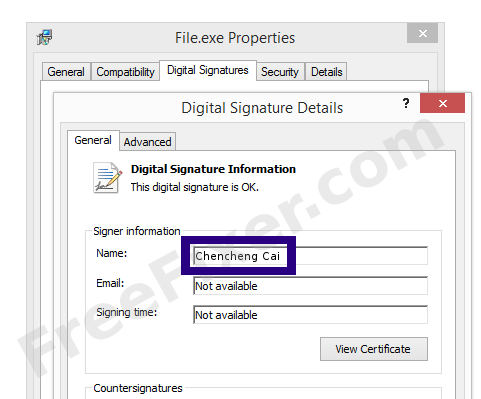Chencheng Cai - 24% Detection Rate *
Did you just stumble upon a download or a file on your computer that is digitally signed by Chencheng Cai? Some of the security products refers to the detected files as Adware.Xadupi.F and Trojan.GenericKD.3400633. The detection rate for the Chencheng Cai files collected here is 24%. Please read on for more details.
You will probably see Chencheng Cai when double-clicking to run the file. The publisher name shows up as the "Verified publisher" in the UAC dialog as the screenshot shows:

You can view the additional details from the Chencheng Cai digital signature with the following procedure:
- Open up Windows Explorer and locate the Chencheng Cai file
- Right-click the file and select Properties
- Click the Digital Signatures tab
- Click the View Certificate button
Here is a screencap of a file signed by Chencheng Cai:

As you can see in the screenshot above, Windows states that "This digital signature is OK". This means that the file has been published by Chencheng Cai and that the file has not been tampered with.
If you click the View Certificate button shown in the screenshot above, you can see all the details of the certificate, such as when it was issued, who issued the certificate, how long it is valid, etc. You can also view the address for Chencheng Cai, such as the street name, city and country.
thawte SHA256 Code Signing CA has issued the Chencheng Cai certificates. You can also examine the details of the issuer by clicking the View Certificate button shown in the screenshot above.
Chencheng Cai Files
The following are the Chencheng Cai files I have gathered, thanks to the FreeFixer users.
| Detection Ratio | File Name |
|---|---|
| 3/57 | winzipersvc.exe |
| 6/55 | winzipersvc.exe |
| 17/57 | winzipersvc.exe |
| 19/52 | wzShellctx64.dll |
| 5/56 | wzUpg.exe |
| 3/54 | winzipersvc.exe |
| 15/55 | winzipersvc.exe |
| 30/55 | winzipersvc.exe |
| 16/52 | winzipersvc.exe |
| 15/55 | winzipersvc.exe |
Scanner and Detection Names
Here's the detection names for the Chencheng Cai files. I've grouped the detection names by each scanner engine. Thanks to VirusTotal for the scan results.
| Scanner | Detection Names |
|---|---|
| ALYac | Adware.Xadupi.F, Trojan.GenericKD.3400633 |
| AVG | Generic.F62, Generic.9CA, Generic.BDE, Elex.AJX, Agent |
| AVware | Trojan.Win32.Generic!BT |
| Ad-Aware | Adware.Xadupi.F, Trojan.GenericKD.3400633 |
| AegisLab | Adwareare.Elex.Gen!c, Adware.W32.Elex!c, Troj.Generickd!c, W32.Application.Agent!c, Adwareare.Elex.Kzsl!c |
| Agnitum | Riskware.Agent! |
| Antiy-AVL | Trojan/Win32.TSGeneric |
| Arcabit | Adware.Xadupi.F, Trojan.Generic.D33E3B9 |
| Avast | Win32:Malware-gen |
| Avira | ADWARE/ELEX.682240, ADWARE/ELEX.juod, ADWARE/ELEX.EL.9, ADWARE/ELEX.kzsl |
| Baidu-International | Adware.Win32.ELEX.CK |
| BitDefender | Adware.Xadupi.F, Trojan.GenericKD.3400633 |
| Bkav | W32.HfsAdware.F324, W64.HfsAdware.F324 |
| Comodo | ApplicUnwnt.Win32.ELEX.A |
| CrowdStrike | malicious_confidence_63% (D) |
| Cyren | W32/Trojan.FLQE-3581 |
| DrWeb | Adware.Mutabaha.1409, Adware.Mutabaha.1055, Adware.Mutabaha.1553 |
| ESET-NOD32 | a variant of Win32/ELEX.HU potentially unwanted, a variant of Win32/ELEX.CK potentially unwanted, a variant of Win32/ELEX.HW potentially unwanted |
| Emsisoft | Adware.Xadupi.F (B), Trojan.GenericKD.3400633 (B) |
| F-Secure | Adware.Xadupi.F, Trojan.GenericKD.3400633 |
| Fortinet | Riskware/Elex, Adware/ELEX |
| GData | Adware.Xadupi.F, Win32.Application.Agent.IVG7H1, Trojan.GenericKD.3400633, Win32.Application.Agent.PIBT7J |
| K7AntiVirus | Adware ( 004d42a81 ), Riskware ( 0040eff71 ), Adware ( 004e85841 ), Adware ( 004f12781 ) |
| K7GW | Adware ( 004d42a81 ), Riskware ( 0040eff71 ), Adware ( 004e85841 ), Adware ( 004f12781 ) |
| Kaspersky | not-a-virus:AdWare.Win32.ELEX.ue, not-a-virus:HEUR:AdWare.Win32.ELEX.gen |
| McAfee | Artemis!01EF6252EDD3, Artemis!95CE1937AF02, Artemis!8C59CA2DF124, Artemis!CF2EF577A536, Artemis!93AD8505BEF2, Artemis!8D51CA62675E, Artemis!0829CB73F335 |
| McAfee-GW-Edition | Artemis!Trojan, Artemis!PUP, Artemis, BehavesLike.Win32.PWSZbot.th |
| MicroWorld-eScan | Adware.Xadupi.F, Trojan.GenericKD.3400633 |
| Microsoft | Trojan:Win32/Xadupi |
| Panda | PUP/Winzipper |
| Qihoo-360 | HEUR/QVM10.1.Malware.Gen, HEUR/QVM10.1.9A76.Malware.Gen, Win32/Virus.Adware.01a |
| Rising | PUA.ELEX!8.E6-YCEz6rIkCT (Cloud), PE:Malware.Generic(Thunder)!1.A1C4 [F], PUA.ELEX!8.E6-PAkq4HK9UXN (Cloud) |
| Sophos | Generic PUA CO (PUA), Generic PUA LP (PUA), Generic PUA HI (PUA), Generic PUA JA (PUA) |
| Symantec | Trojan.Gen.2, PUA.WinZipper, Heur.AdvML.B |
| TrendMicro | TROJ_GEN.R00JC0DGM16, TROJ_GEN.R0C1C0DGE16 |
| TrendMicro-HouseCall | TROJ_GEN.R0C1C0DGE16 |
| VIPRE | Trojan.Win32.Generic!BT |
| ViRobot | Adware.Elex.682240[h] |
| Yandex | PUA.ELEX!, Riskware.Agent! |
| Zillya | Trojan.GenericKD.Win32.15061 |
| nProtect | Adware.Xadupi.F, Trojan.GenericKD.3400633 |
* How the Detection Percentage is Calculated
The detection percentage is based on the fact that I have gathered 548 scan reports for the Chencheng Cai files. 129 of these scan reports came up with some sort of detection. You can view the full details of the scan results by examining the files listed above.
Analysis Details
The analysis has been done on certificates with the following serial numbers:
- 0f395e2e0df921c128d0ab05055af826
- 4e1f202eb0ef7eb74a664b970be2ebe4
- 3308ced5c19726541b196f805ac50cd0
- 39a38a5d3c9c2d742b7557735b889436
- 45662f19ec75783e0da2e05867975b38
- 482a1e80663ce8516b8d192494081e28
- 3075116cd57c1e0cd4624d000e0d48f4
- 3d9b7512e1e6f7c1b6d38f1fd96b4ab3